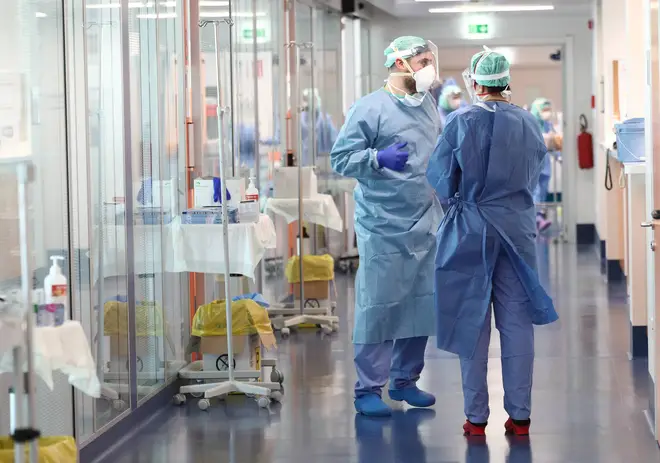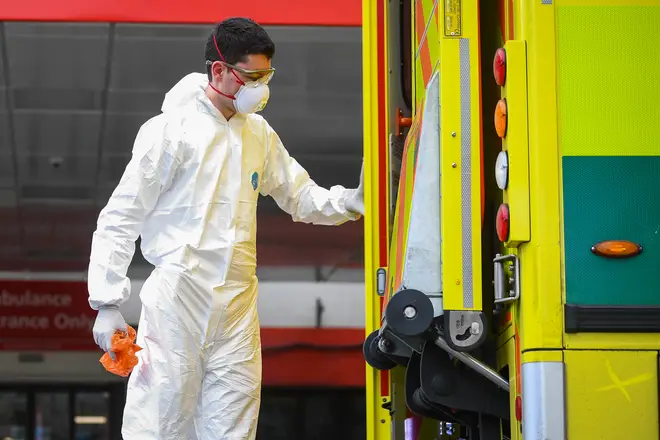
Nick Ferrari at Christmas 1pm - 3pm
2 April 2020, 06:30

UK doctors could be made to choose to withdraw lifesaving treatment from coronavirus patients in favour of those more likely to survive, new guidance for doctors has warned.
The British Medical Association's (BMA) latest ethics advice said health professionals could be forced to make "grave decisions" should hospitals become overwhelmed with patients.
The document warns that decisions around rationing scarce resources, such as ventilators, could determine whether large numbers of patients will receive life-saving treatment or not.
It comes as the UK experienced its biggest day-on-day rise in deaths so far, with the Government now facing increasing pressure over its Covid-19 testing policy.
Some 2,352 patients have died in hospital after testing positive for the virus as of 5pm on Tuesday, the Department of Health said.
Follow all the latest news about coronavirus on our live blog

The BMA's new guidance - published on Wednesday - aims to ensure doctors have clear and "ethically sound support" should they have to make tough decisions around patient care during the pandemic.
Dr John Chisholm, chairman of the BMA's medical ethics committee, said: "Looking ahead to the coming weeks, if hard choices are required, we know they will be contested. There will be anger and pain.
"People who, in normal circumstances, would receive strenuous treatment may instead be given palliation in order to favour those with greater likelihood of benefiting.
"Nobody wants to make these decisions, but if resources are overwhelmed, these decisions must be made."
The BMA's guidance states that during the peak of the pandemic doctors may have to assess a person's eligibility for treatment based on a "capacity to benefit quickly" basis.
"Health professionals may be obliged to withdraw treatment from some patients to enable treatment of other patients with a higher survival probability," the guidance states.
"This may involve withdrawing treatment from an individual who is stable or even improving but whose objective assessment indicates a worse prognosis than another patient who requires the same resource."
Here's an update to bring you up to speed on some of the things that we are doing to protect our NHS.
— Boris Johnson #StayHomeSaveLives (@BorisJohnson) April 1, 2020
We will beat coronavirus together by staying at home, protecting our NHS and saving lives. #StayHomeSaveLives pic.twitter.com/FOYfvzlQPC
Prime Minister Boris Johnson said in a video posted on Twitter that the lastest rise in deaths was a "sad, sad day" and that his "thoughts go out to the families of the victims".
To cope with the inevitable rise in patients, field hospitals around the country are being built to raise the number of beds in the country by 33,000.
The NHS Nightingale in London's ExCel centre is one such hospital, and is expected to open later this week.
It will initially open to 500 patients, before being extended to accommodate 4,000.
A study earlier this week showed 1 in 4 NHS workers are currently off work and self-isolating after showing coronavirus symptoms, and it is estimated 85 per cent of these would be able to return to work if they were tested.But of the 550,000 NHS workers across the country, only 2,000 have so far been tested for the virus.
NHS England has now written to its trusts, ordering them to carry out mass testing for frontline staff.
The organisation sent a letter to all of its trusts and foundation trust saying the government has now lifted its 15 per cent cap on testing staff for coronavirus.The Government has faced intense scrutiny over its Covid-19 testing policy for both NHS workers and the wider public.
Meanwhile, Professor Yvonne Doyle, medical director of Public Health England (PHE), told a Number 10 daily press briefing that 10,000 coronavirus tests per day were now being carried out and the aim was to get to 25,000 tests by mid-April.
She said the intention was to "get from thousands to hundreds of thousands" of tests for frontline workers in the coming weeks.

A look around the NHS Nightingale Hospital - London's new coronavirus centre
PHE has come under fire over wider testing of members of the public with Covid-19.
It has said repeatedly that most adults who develop symptoms will fully recover and do not need to be tested.
However, many scientists disagree and say it is only through widespread community testing that the UK will be able to track the virus and emerge from lockdown.
Prof Doyle told reporters there was an intention to scale up this sort of testing.
She said: "In terms of mass testing, the testing strategy is to increase the amount of testing done not just in healthcare workers but in the population.
"The rate-limiting step there is not us, it is really whether the tests are valid and then to get that out and about, and aided by technology."
Until now, the focus has been on testing patients in hospital to see if they have coronavirus, with NHS trusts told earlier in the week they should use up to 15% of any spare testing capacity for NHS staff.